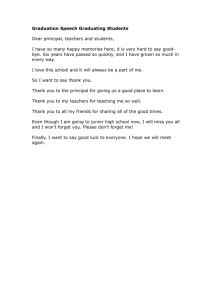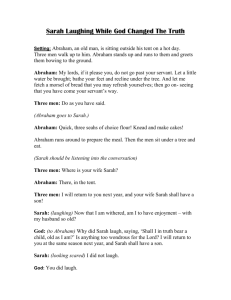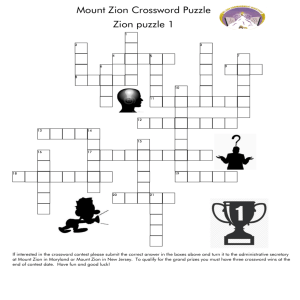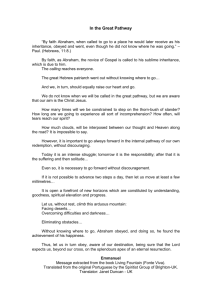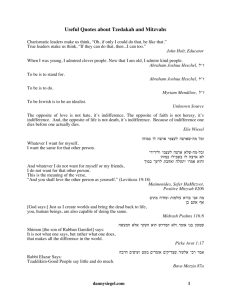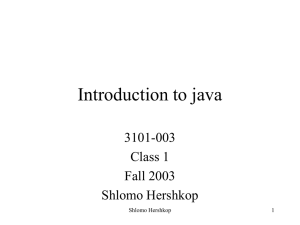(Don't) Forget to Change
advertisement
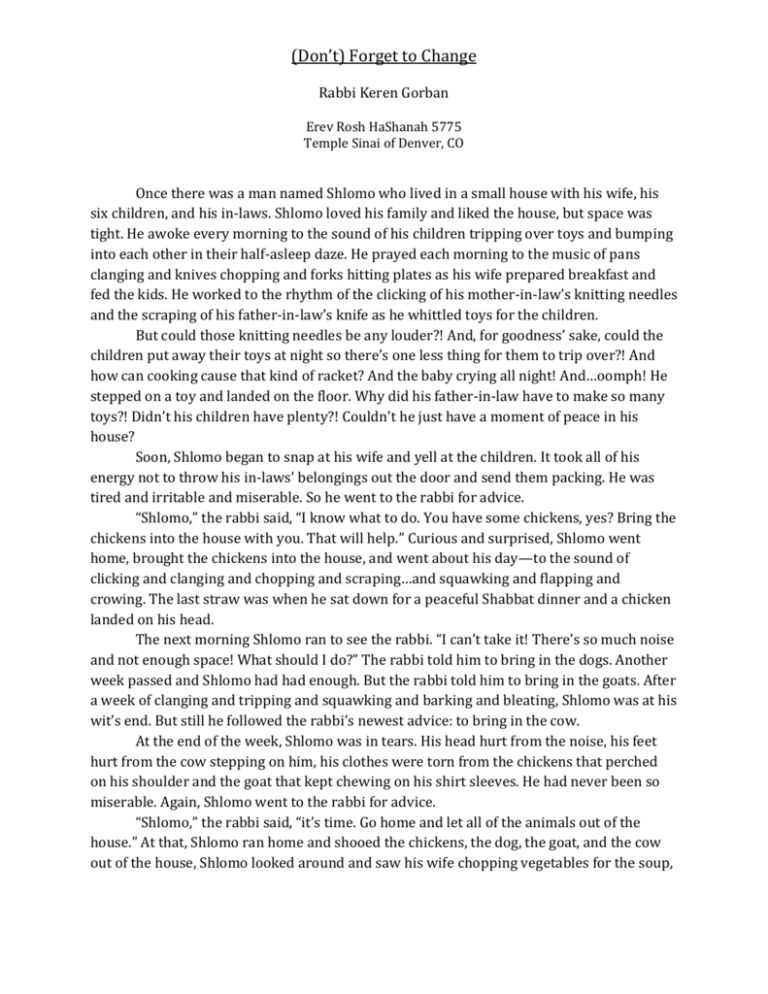
(Don’t) Forget to Change Rabbi Keren Gorban Erev Rosh HaShanah 5775 Temple Sinai of Denver, CO Once there was a man named Shlomo who lived in a small house with his wife, his six children, and his in-laws. Shlomo loved his family and liked the house, but space was tight. He awoke every morning to the sound of his children tripping over toys and bumping into each other in their half-asleep daze. He prayed each morning to the music of pans clanging and knives chopping and forks hitting plates as his wife prepared breakfast and fed the kids. He worked to the rhythm of the clicking of his mother-in-law’s knitting needles and the scraping of his father-in-law’s knife as he whittled toys for the children. But could those knitting needles be any louder?! And, for goodness’ sake, could the children put away their toys at night so there’s one less thing for them to trip over?! And how can cooking cause that kind of racket? And the baby crying all night! And…oomph! He stepped on a toy and landed on the floor. Why did his father-in-law have to make so many toys?! Didn’t his children have plenty?! Couldn’t he just have a moment of peace in his house? Soon, Shlomo began to snap at his wife and yell at the children. It took all of his energy not to throw his in-laws’ belongings out the door and send them packing. He was tired and irritable and miserable. So he went to the rabbi for advice. “Shlomo,” the rabbi said, “I know what to do. You have some chickens, yes? Bring the chickens into the house with you. That will help.” Curious and surprised, Shlomo went home, brought the chickens into the house, and went about his day—to the sound of clicking and clanging and chopping and scraping…and squawking and flapping and crowing. The last straw was when he sat down for a peaceful Shabbat dinner and a chicken landed on his head. The next morning Shlomo ran to see the rabbi. “I can’t take it! There’s so much noise and not enough space! What should I do?” The rabbi told him to bring in the dogs. Another week passed and Shlomo had had enough. But the rabbi told him to bring in the goats. After a week of clanging and tripping and squawking and barking and bleating, Shlomo was at his wit’s end. But still he followed the rabbi’s newest advice: to bring in the cow. At the end of the week, Shlomo was in tears. His head hurt from the noise, his feet hurt from the cow stepping on him, his clothes were torn from the chickens that perched on his shoulder and the goat that kept chewing on his shirt sleeves. He had never been so miserable. Again, Shlomo went to the rabbi for advice. “Shlomo,” the rabbi said, “it’s time. Go home and let all of the animals out of the house.” At that, Shlomo ran home and shooed the chickens, the dog, the goat, and the cow out of the house, Shlomo looked around and saw his wife chopping vegetables for the soup, the children playing on the floor, and the in-laws knitting and whittling. He breathed a sigh of relief and thought, “There’s so much room! And it’s so quiet! Finally some peace.” Our memories are funny things. How many of us have disliked something, only to decide once it’s gone that we actually liked it? Other times, our brains fixate on phrases or ideas or emotions and suddenly, that’s all we experience. All too often, we remember utterly inane, useless information, but forget of some of the things we need to know. And haven’t we all sat with friends or family reminiscing when someone butts into our story to say, “That’s not how it happened!” Sometimes our imperfect minds are a liability—on a test, trying to think of a person’s name, when we need to find that one piece of paper among the piles on our desks. And sometimes, especially in our relationships with others and with ourselves, we need our memories to be imperfect. When we remember everything with perfect clarity— the sweet, generous, or loving moments, along with the ordinary, everyday, nothing-special moments, together with the infuriating, frustrating, or painful moments—the balance is likely to tip toward the undesirable aspects of our relationships. There are a number of reasons for this: our negative emotions are often more powerful than our positive ones, we have a tendency to discount our neutral experiences, and we may actually experience more of those bad moments than good ones. And yet, we don’t usually consider our relationships with our close friends and family to be bad. Not only do our brains enhance and cherish those sweet, generous, or loving moments so that they take precedence over the others, we also spin some of the notso-great moments into funny stories and remember them as positive. On top of that, we blur many of the unimportant ordinary and challenging times to make the good stand out more clearly. My younger brother was a pain in my tuchus growing up, as little siblings— especially brothers—tend to be. I used to call him my “baby bother” for that reason. I remember that much. But I don’t really remember all of the ways he needled me and irritated me. Except that he had the most ingenious way of winning any fight: he would hit me and then start crying. My parents would come running and I would get in trouble. It was not amusing at the time, I’m sure, but in the years since, those incidents have taken on the nice rosy glow of memory. They go nicely with the memories of hikes and favorite jokes and building things together. Our flawed brains can help us maintain our relationships by changing how we remember reality. But sometimes our minds work against us. Instead of minimizing the instances of pain and frustration and anger, we blow them up until they obscure everything else. It’s like Shlomo, who went about each day noticing only the sounds and experiences that irritated him. He couldn’t see the joy that his father-in-law brought to the children as they played with the toys. He didn’t notice his wife’s effort to occupy the children with breakfast so that he could pray in peace. He missed the new sweaters and blankets that his mother- in-law made to keep the family warm as the weather cooled. He only noticed all the ways they were obviously trying to annoy him. Although we occasionally find ourselves in a situation where it seems like someone (or everyone) is trying to find each and every way to provoke us, most of the time it’s not so extreme. Instead, over the course of years, our loved ones hurt and upset us in a variety of different ways that we try to ignore and move past. Forgive and forget—right? Except that we don’t always forgive or forget, especially not when a similar experience reminds us of a previous slight. Whether it’s a friend who cancels plans last minute, or a spouse who forgets your anniversary, or a coworker who doesn’t respond to an urgent email in a timely manner, we forgive and forget until it happens again…and again…and again. To some extent, we need to remember these repeated offenses. We need to learn what the people we interact with regularly are capable of—and what their limitations are. And, we need to pay attention when these incidents are more than just annoyances, as we determine whether working, friendly, or romantic relationships can continue in the longterm. But at a certain point, we also need to own our own response—does the other person intend to hurt or irritate or disregard us, or are we annoyed that things aren’t the way we’d like them to be? If there’s intent, we need to address the underlying issue. Often, however, we, like Shlomo, simply find ourselves overreacting to the things we can’t control. Sometimes, however, the offense is more than an annoyance. When someone hurts us deeply, it takes time to heal the pain, the betrayal, and the loss of trust. And despite forgiving the person, we’re wary for a long time afterwards, out of worry that it will happen again. That concern, that inability to forget, is essential until trust is built again. In order to move on completely, though,—whether we remain in relationship with that person or not—we also have to forget, to let go, to let the memory blur and fade. Abraham and Sarah, two of the main characters from our Rosh HaShanah Torah readings, set an interesting example. Abraham and Sarah were married for approximately a hundred years, during which time they dealt with moving far away from their families to start a new life and religion, infertility, dangerous situations, and a handful of other challenges. Through this, their relationship seems to have been a strong one. Still, I imagine that they had to work hard to maintain their trust and respect for one another through all of the challenges that they faced. To begin with, Abraham asked Sarah to pretend to be his sister to protect his life— twice. And both times, she was taken by the local king to be his wife (don’t worry, the kings both discovered the ruse before consummating the marriage). While I imagine that Sarah might have agreed to act as Abraham’s sister the first time, my guess is that she was not happy with Abraham when, all of a sudden, she was engaged to the king and couldn’t see a way out of the situation. But the second time? I can hear her arguing with Abraham, trying to remind him that it didn’t go so well the first time, so there better not be a second. Or maybe Abraham knew that Sarah would not agree to the charade again, so he didn’t tell her at all. The Torah just says that Abraham told the king that Sarah was his sister and that the king took her for a wife. Whether Abraham went against Sarah’s wishes or he went behind her back, Abraham breached Sarah’s trust when he lied to the second king. Yet these deceptions don’t haunt their relationship. The two stories happen as isolated incidents and are never referenced again. I hope that Sarah held Abraham accountable for that second act of deceit, at least to impress upon him how it hurt her. However, in order to maintain the strength and trust in their relationship, Sarah had to allow those memories to fade from her mind and from the way she interacted with her husband. I doubt that it was easy, and I wouldn’t be surprised if there were times when Abraham did something that reminded her of those earlier incidents. But they happened in a past that cannot be changed. So rather than remaining stuck in that past, in those memories, she let go of them—and of her own sins—and made room in her mind and in her heart for goodness in the future. During the Yamim Noraim, these Days of Awe and repentance, we are expected to remember, to make an accounting of our deeds from the past year, especially the ways in which we missed the mark and fell short of our potential. We do this, not to dwell on how terribly imperfect we are, not to beat ourselves up over our mistakes, but to give us a chance to acknowledge our failings and those of the people around us and move on with our lives. Without this opportunity to confess, to apologize, to atone, we pile up the weight of guilt from sins of years ago. Without this reminder, we let wounded feelings, broken trust, and anger fester until they destroy our relationships. If we can use these days to gather up our mistakes and our failings from the past year, to learn from them so that we can do better in the coming years, and to apologize where appropriate, then we can put them away in the back recesses of our minds and let them fade away. In order to grow into the people we aspire to be and to let others do so as well, we have to learn to let go, to start to forget what was to make room for what can be. I have always found it interesting that the word shanah, as in, Rosh HaShanah, which means “year,” has the same root as the word “change”—shinui is the noun, l’shanot is the verb. Although we often imagine the calendar as a circle, where we come back to the same months and holidays each year, we never return to exactly the same place. This Rosh HaShanah, you and I are not the same exact people as we were last year. We’ve changed. And if I imagine you, or if you imagine yourself, as the same person you were last year— with it’s bad and it’s good—then you have no opportunity to change and grow. Hopefully the goodness within us is like a fine wine, getting better with age. And hopefully, by remembering our flaws, we learn from them and find ways to minimize their power and effect. We need to let those memories of the past fade enough to allow that growth and change. My “baby bother” is not the same person that he was twenty years ago—he’s matured a bit, he’s respected and successful in his job, and he no longer hits me and starts crying when he wants to win a fight. If I only related to him as the baby bother from our childhood, I’d never be able to have the closer sibling relationship we’re developing as adults. Likewise, if Shlomo’s family only remembered him as the irritable, angry, crazy guy who brought all the animals to live in the house, they’d never have the love and peace that Shlomo so desperately wanted. Shlomo’s family and I had to forget enough to let our loved ones change. On Rosh, the “head” or the “beginning,” HaShanah, we begin the changes that we want to make over the coming year by remembering what we have done to learn how to move forward. By the end of Yom Kippur, if we’ve done the work of remembering our sins, apologizing to the people we’ve hurt, and approaching those who have hurt us to give them the chance to apologize, we can let go of the guilt and the anger and the memories that keep us stuck in the past. And then, we can move forward, growing into lives of blessing, wholeness, and holiness. L’shanah tovah—may you change for good in this new year.
